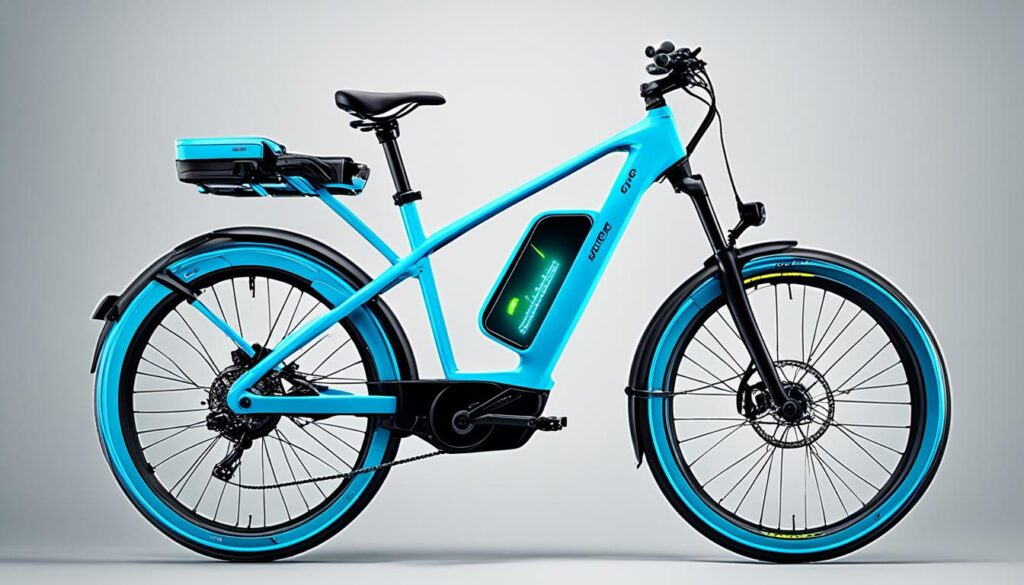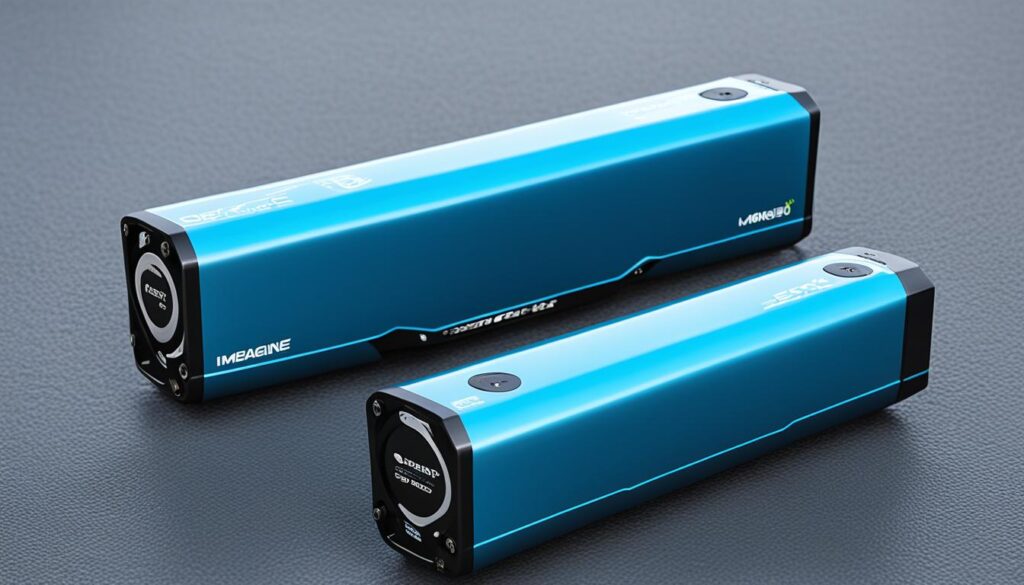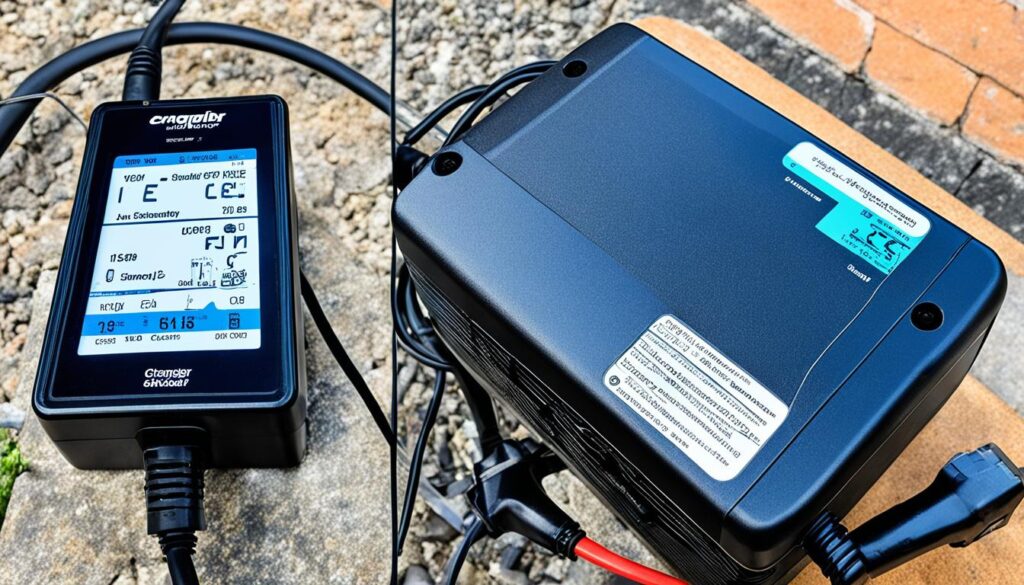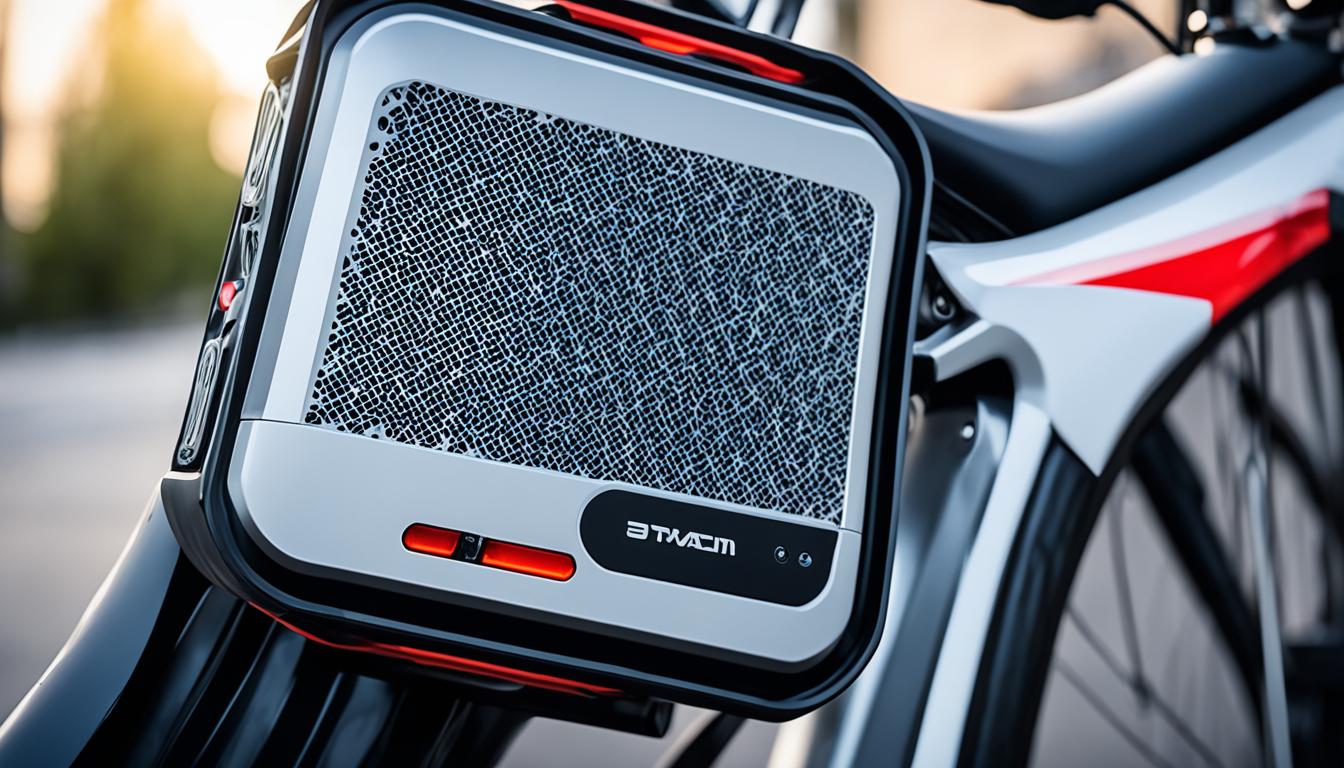Are you tired of running out of power in the middle of a thrilling e-bike ride? Wondering how to choose the best e-bike battery that can keep you going for miles? Look no further! In this article, we’ll uncover the essential information you need to know about e-bike batteries and charging systems.
From understanding the different types of electric bike battery packs to finding the right charger for efficient charging, we’ve got you covered. So, are you ready to amp up your e-bike experience and ride with confidence?
Key Takeaways:
- Learn about the different types of e-bike battery packs
- Discover tips for choosing the best e-bike battery
- Understand the importance of a reliable battery management system
- Find out when it’s time for an e-bike battery replacement
- Get insights on selecting the right e-bike battery charger
Understanding E-bike Battery Technology

When it comes to e-bike battery technology, lithium-ion batteries reign supreme. These powerful, lightweight batteries have revolutionized the world of electric bikes, offering longer ride times and greater range than ever before.
So, what makes lithium-ion e-bike batteries so special? For starters, they pack a punch in terms of energy density. This means you can enjoy a longer ride without worrying about running out of power. Plus, they’re lighter than other battery options, making your e-bike more nimble and enjoyable to ride.
But it’s not just about the battery itself. To truly optimize your e-bike battery performance, you need a reliable battery management system. This essential component ensures that your battery operates efficiently and safely, maximizing its lifespan and preventing any potential issues.
“A good battery management system for e-bikes is like having a trusty co-pilot. It takes care of the crucial tasks, such as monitoring the battery temperature, voltage levels, and charging cycles, allowing you to focus on enjoying your ride without any worries.”
The Importance of Battery Management Systems
A battery management system (BMS) acts as the brain of your lithium-ion e-bike battery. It constantly monitors and controls the battery’s performance, ensuring optimal operation and protection against overcharging, excessive discharging, and other potential hazards.
Not only does a BMS safeguard your battery, but it also extends its lifespan. Maintaining the battery’s voltage and temperature within safe limits helps prevent premature degradation and ensures that you get the most out of your investment.
Additionally, a reliable BMS provides accurate battery status information, allowing you to keep track of your remaining range and plan your rides accordingly. This ensures that you never get caught off guard with a depleted battery, giving you peace of mind and a worry-free riding experience.
The Future of E-bike Batteries
As e-bike technology continues to advance, lithium-ion batteries and sophisticated battery management systems will play an even more significant role. Manufacturers are constantly innovating to design batteries that are more efficient, longer-lasting, and faster charging.
With the ever-increasing popularity of e-bikes, battery technology will continue to evolve, offering riders more power, longer range, and enhanced performance. So, whether you’re a casual rider or a dedicated adventurer, the future is bright for e-bike battery technology.
In the next section, we’ll dive deeper into the factors to consider when choosing the right e-bike battery for your specific needs. Stay tuned!
Choosing the Right E-bike Battery

When it comes to choosing the right e-bike battery, it’s important to consider your specific needs and preferences. A high-capacity e-bike battery can provide you with longer rides and increased power, ensuring you can go the distance without worrying about running out of juice.
With a high-capacity e-bike battery, you can conquer challenging terrains and tackle steep hills with ease. The extra power and extended range allow you to explore new trails and enjoy longer adventures on your electric bike.
But what about battery replacement? As with any battery, the time will eventually come when it needs to be replaced. Signs that indicate it’s time for an e-bike battery replacement include shorter ride durations, decreased power output, and difficulty holding a charge.
When you’re ready to replace your e-bike battery, be sure to choose a high-quality replacement that matches the specifications of your original battery. Investing in a reliable and compatible battery will ensure optimal performance and longevity for your electric bike.
Factors to Consider When Choosing an E-bike Battery Replacement:
- Battery Capacity: Determine the capacity you need based on your riding style and distance requirements. A higher-capacity battery will allow for longer rides.
- Battery Type: Consider whether you prefer a lithium-ion battery or another type that suits your riding needs and budget.
- Compatibility: Ensure the replacement battery is compatible with your specific e-bike model and battery system.
- Brand Reputation: Research reputable brands known for their quality e-bike batteries and customer satisfaction.
- Warranty: Look for a replacement battery that comes with a warranty to protect your investment.
Remember, choosing the right e-bike battery is essential for maximizing your riding experience. Don’t settle for less when it comes to power, performance, and reliability.
By considering these factors and understanding the benefits of a high-capacity e-bike battery, you can make an informed decision and enjoy an electrifying ride every time you hop on your e-bike.
| Battery Capacity | Battery Type | Compatibility | Brand Reputation | Warranty |
|---|---|---|---|---|
| High-capacity | Lithium-ion | Compatible with specific e-bike models | Reputable brands known for quality | Warranty included |
Charging Systems for E-bike Batteries

When it comes to keeping your e-bike powered up and ready to go, having a reliable charging system is crucial. A high-quality e-bike battery charger ensures efficient charging and maximizes your ride time. Let’s dive deeper into the world of e-bike charging systems and explore some valuable insights and tips.
Choosing the Right E-bike Battery Charger
Not all e-bike battery chargers are created equal, so it’s important to choose the right one for your specific battery pack. Consider factors such as compatibility, voltage, and charging time. Look for a charger that is specifically designed for your e-bike’s battery model to ensure optimal performance and longevity.
Additionally, pay attention to the charger’s charging capacity. A higher-capacity charger can charge your battery faster, reducing downtime and allowing you to spend more time on the road. However, be cautious not to exceed the recommended charging capacity for your battery, as it may affect its lifespan.
Tips for Efficient Charging
To get the most out of your e-bike battery charger and ensure efficient charging, here are some valuable tips:
1. Always follow the manufacturer’s guidelines for charging your battery and using the charger.
2. Plug the charger directly into a wall outlet to avoid power loss through extension cords.
3. Store and charge your battery in a cool, dry place to prevent overheating and optimize its performance.
4. Avoid overcharging your battery by monitoring the charging time and disconnecting it once it’s fully charged.
5. Consider investing in a charger with smart charging capabilities that automatically adjusts the charging process for optimum results.
By following these tips, you can ensure efficient and safe charging while extending the lifespan of your e-bike battery.
In Summary
A reliable e-bike battery charger is essential for keeping your e-bike powered and ready for your next adventure. Choose a charger that is compatible with your battery pack and has the right charging capacity for efficient performance. Implementing smart charging practices will optimize your battery’s lifespan and maximize your time on the road. Now that you’re equipped with the knowledge of e-bike battery charging systems, get ready to enjoy longer rides and endless fun!
Conclusion
Now that you have all the essential information about e-bike batteries and charging systems, it’s time to take your riding experience to the next level. Armed with the knowledge of different types of electric bike battery packs and tips for finding the best one, you can ensure long rides and lasting power.
Remember, choosing the right e-bike battery is crucial for maximizing your ride time, and a high-capacity battery can provide the advantage you need. Keep an eye on your battery’s health and know when it’s time for a replacement to avoid any unexpected power issues during your rides.
And when it comes to charging, make sure to find the right e-bike battery charger. Efficient charging can significantly impact your ride experience, ensuring a full and quick charge for your battery.
So, equip yourself with the knowledge you’ve gained, find the perfect e-bike battery, and get ready to revolutionize your e-bike experience. From long rides to mountain adventures, your e-bike will now be powered by the best technology and expertise.
